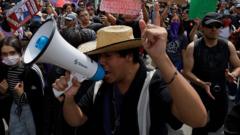In his return to the presidency, Donald Trump has sought to implement an economic vision grounded on the notion that the contemporary international liberal order has been mostly negative to America’s interests. In response to this purported reality, Trump has argued that raising tariffs on foreign goods is an effective means to restore his country’s economic might. Several months into his presidency, Trump’s actions have started to reshape the main contours and the very functioning of the global economy. Among the many countries impacted with actual or proposed tariffs, Brazil emerged as one that would be taxed at some of the highest rates (50%) on most of its exports into the US.
Like the US, Brazil has faced a polarized political scenario in recent years. Trump’s main admirer and emulator in Brazil, former president Jair Bolsonaro, is under investigation for his role in supporting an attempted coup d’etat against the legitimate government of the then recently elected and returning president Lula da Silva. In a letter sent to President Lula da Silva on July 9th, Trump explained that unless the on-going trial against Bolsonaro were dismissed, including by means of a suggested (and clearly illegal) interference of Lula himself over the workings of the country’s supreme court (the Federal Supreme Tribunal, STF). Should this not occur, Brazil was to suffer from new and extremely high new rates when its products were to enter the US. The move surprised many, particularly those that have not been paying close attention to the domestic political reality of Latin America’s largest economy and society.
Considering Trump’s affiliation with Bolsonaro, whom he sees as an important ally in the defense of his ideological views and policies in the region, it is not surprising that the US president would not be happy with the fact that Bolsonaro is under investigation for having tried to pull off a similar coup that Trump’s supporters had attempted on January 6th, 2021. It seems that Trump desires the case to be dismissed as this outcome could corroborate – even vindicate, by equivalence – Trump’s narrative that he was a victim of a witch hunt and that there never had been an attempted coup conducted by his supporters and on his behalf. What is nonetheless troubling is the fact that Trump would resort to economic punishment to try to produce a political outcome to his liking. In so doing, Trump reverts back to old patterns of US behavior not seen so clearly since the first quarter of the twentieth century. A letter sent to Lula mentioned an inaccurate justification for the new tariffs, that of a persistent trade deficit against the US in commercial balance between the two countries. Lula was quick to respond, stating that his nation would not accept interference by any foreign powers, regardless of their might, that Brazil is a sovereign state, and that it would find ways to respond should the tariff indeed take effect.
Trying to make sense of these events, some have argued that Trump’s move against Brazil was in fact aimed at the BRICS in general. Since the bloc had held its annual meeting in Rio de Janeiro one week before Trump’s decision. Others have suggested that this was a protective measure to defend key U.S. industries, such as steel, which have been facing continued difficulties against cheaper products from Brazil. Considering though that the very rationale articulated in Trump’s letter, that of a trade deficit, has no basis in reality that argument is not sufficient to explain Trump’s position. One thus needs to examine the ideological alignments between Trump and Bolsonaro, and especially the way that Trump sees the latter’s proposed exoneration as corroborating his own narrative of being a victim of politically orchestrated and illegitimate persecution. Local reactions to Trump’s announcement unfolded along very clear ideological camps. On the right, notwithstanding their leader’s growing legal travails, Bolsonaro’s supporters remain very influential in politics, the media and among important economic areas, such as the agribusiness sector. On the left, Lula’s immediate response stating that Brazil would respond in kind indeed pleased his traditional constituents, though the opposition and many in the media pinned the blame on Lula for not being able to forge compromise with the Trump administration.
Ironically, key industrialists in the powerful state of Sao Paulo – where Bolsonaro’s powerful ally and one of the most viable names in the opposition to Lula, Tarcisio de Freitas serves as governor – will be the first ones affected by the new tariffs. Though the pain will likely spread into other activities, including in the countryside. Considering though that the bulk of the country’s agricultural exports go to China, the main questions in the upcoming months might be of whether these powerful exporters will act pragmatically and work with Lula to enlarge trade with the Asian giant? Or will they rather continue to act ideologically and continue to support Bolsonaro’s enduring partnership with Trump against their own economic interests? When the final list of items to be targeted by the new tariffs by the US government was published in late July, many exemptions had been made, largely due to the skillful negotiation that a high-level delegation of Brazilian leaders.
Among some of the most important items exempted from the new tariff were airplanes and aeronautical parts, one of Brazil’s main valued-added export, cellulose, iron ore, oil and oil derivatives. Surprisingly, though some of the products that can’t easily find substitutes in the US market, like coffee, beef, and timber, were not exempted, at least not yet. That is why the main goal of Brazilian authorities continues to be that of trying to enlarge the list of exceptions. Large business leaders also have been working towards this same goal, holding conversations with representatives of the US private sector, as well as trying to lobby members of the US Congress. The idea is to convince the Americans that there is commercial logic in the requests, arguing that the markets are complementary and that the tax could make products more expensive in the US market itself. Dialogue and the pursuit of negotiated deals have been hallmarks of Brazil’s diplomacy, and even in the middle of these latest heated diplomatic exchanges, Lula reiterated his willingness to negotiate, but not at the cost of Brazil’s sovereignty and constitutional independence. In this, Lula finds support among some of the key legal actors involved in this dispute, particularly Supreme Court’s Justice Moraes, the one responsible for leading the case against Bolsonaro. In two additional, often mentioned, motives of Trump’s actions, the Brazilian government has given no sign to be planning on reversing course.
Brazil has filed an official response to the Office of the United States Trade Representative’s investigation about alleged unlawful practices against US companies, stating that the country does not adopt discriminatory, unjustifiable or restrictive trade policies with the US and that there is no legal or factual basis for imposing sanctions. It also argues that bilateral trade is mutually beneficial and that the United States has a historic surplus in the relationship. Brazil also stressed that it has promoted reforms in sectors pointed out by the US and that all of them are compatible with multilateral standards. In its defense of its Pix payment system, Brazilian authorities argue that the system increased the participation of Brazilians in the banking system and that this development had been object of praise by entities such as the IMF and the OECD. Brazil’s response also points out that Pix has increased competition in the electronic payments market, which has led to an increase in the participation of private companies, including American companies. Regarding alleged censorship against US Big Tech corporations, Brazil argues that no judicial decision or court order related to the issue results in discriminatory measures that harm the fundamental rights of any party or the ability of US companies to compete in Brazil or in the global market. Finally, the document also points out that it is normal practice for national legislation to establish formal requirements for the operation of foreign companies in their territory, with a view to issues of legal responsibility.
Thus far, it seems that Trump is more interested in bringing back some old patterns of ideologically driven behaviors, such as that of picking sides in the internal political disputes of foreign nations. Though Trump’s final decision to impose the new rates of tariffs against Brazil late last month was grounded on a law granting special powers to the presidency given the case of a strong national emergency – though it is really hard to see how trade with a foreign nation where the US has consistently sustained a strong surplus could qualify as such an emergency. Brazil’s initial reactions to Trump’s aggressive actions have been hailed among relevant observers beyond Brazil, some of whom see Lula’s responses as placing his country at the center of a global movement to resist Trump’s new imperialist designs. Brazil is indeed one of the few countries that has more assertively resisted Trump’s new economic policies as they pertain to international trade. It is to be assumed, should one focus more on the history of trade, as well as compare power capabilities between Brazil and the US, that Trump can resist the growing frictions in the bilateral relations for much longer than Lula can. Yet Brazil’s economic dependence on exports to the US has fallen to around 10% – less than half of what they used to be 20 years ago.
Despite the fact that Brazil’s industrial base has shrunk in the last three decades, its exports are now sent to a more diversified list of countries, particularly those in the Global South. Though certainly not linear, nor smooth, Brazil’s emergence in the world scenario has by now become an established notion in global geopolitics. The country wields considerable economic and political influence as the largest and most populous country in Latin America. It represents today one of the most important defenders of multilateralism and it sustains robust ties with China, the United States, the European Union, neighboring countries, as well as economies located on all corners of the world.
In addition to sustaining talks with US authorities and to publicly condemning Trump’s actions, Lula has spoken to China’s president Xi Jinping, Russia’s president Vladimir Putin and India’s president Narendra Modi, as well as with leaders of other countries affected by Trump’s trade policies, such as president Macron of France. In the meantime, Lula’s government has announced an ambitious plan of fiscal subsidies to compensate at least some of the commercial losses that many Brazilian exporters are starting to face. Thus, Brazil might be able to withstand Trump’s actions for longer than expected – even if Lula himself faces strong criticism in the domestic front. Media-led domestic criticisms have been a regular staple in all Lula’s three terms in office. Already in the early 2000s, though the country’s economy was booming and its image on the world stage was rising, depictions of corruption in the federal government were a daily occurrence. In 2018, this resulted in Lula’s questionable arrest – in a now discarded case considered politically motivated by Brazil’s supreme court – pave the path to Bolsonaro’s election to the presidency. Now, back in office on a broad democratic coalition, Lula faces an even stronger opposition in Congress and in the oligarchic media cartel that dominates the country’s news landscape.
Trump’s ties to the extreme-right opposition have certainly helped Lula’s detractors, at least until now when many Brazilians see his actions as an attack not only against Lula’s government, but on the country itself. Still, the opposition’s main figure, and someone very appealing to the most powerful economic elites of the country, the governor of the rich state of Sao Paulo, continues to defend Trump’s actions, or at least to say that Lula is at fault given his unwillingness to work with the US president to resolve the situation. For his part, Lula has stated that though always open to negotiate with Trump, that he was in no rush to strike a deal, nor to retaliate against U.S. tariffs. He said his country has some leverage, such as in the case of rare earths, but that this should be used with caution and dignity, as a matter of national sovereignty. In effect, though initially serving to motivate his supporters on the left to rally around a nationalist narrative of protecting the nation against foreign interference, it is unclear whether Trump’s decision will provide long-lasting support for Lula, a president who has otherwise not been doing great on political polls.
In contrast to Brazilians’ deteriorating view of Trump, there has been an improvement in their views about China. This could accelerate Brazil’s strategic re-calibration toward China, the country’s main trading partner since 2009. Foreign Minister Wang Yi said that China “firmly” supports Brazil in defending its national sovereignty and dignity, and it opposes “unjustified interference in Brazil’s internal affairs.” Lula’s balancing acts of trying to negotiate with US leaders while expanding commercial ties with other nations is not so different from what he managed so successfully to do 20 years ago. What has changed since are the domestic and global contexts in which Lula now operates. While his opposition is more aggressive and better prepared than before, what used to be seen as a progressive pursuit of an autonomous and assertive foreign policy is now being interpreted by many in Brazil and especially in the United States as inappropriate, if not worse. Recent revelations that the Bolsonaro family, particularly his son Eduardo – who even still being an official member of Brazil’s Chamber of Deputies has resided in the US for the last six months – has actively lobbied Trump to act against Lula’s government, and particularly the fact that a significant number of Brazilians still support the Bolsonaro family or at least its main associates, certainly do not bode well for Brazil’s democracy.
The close links between the extreme-right in Brazil and the US are not going to go away any time soon. It seems therefore essential that the Lula government does not act naively by assuming that whatever nationalistic gains it may have obtained in the last few weeks will necessarily last until next year’s decisive presidential election. Trump is likely to sustain its harsh stance against Brazil for the time being, especially after another Justice at the country’s Supreme Court has decided that the implementation of financial restrictions on Brazilian authorities based on the US Magnitsky Act are not valid in Brazil unless approved by the Court itself. The US was quickly to respond, doubling down on its threats against Brazil’s leaders and stating that it won’t accept any restrictions on its decision to sanction those acting against the US national interests.
Though there are clear reasons to be concerned about the short-term prospects for Brazil-US relations, the impacts of the deterioration of terms of trade between the two counties may not hit the South American giant as bad as it would have been the case in the past. The US is still an important economic partner but not as much as before. Trade with BRICS countries, particularly China, as well as with other emergent nations now represent the bulk of Brazil’s exports, and Lula plans to increase exports figures in the upcoming few years, particularly with India and Mexico. Moreover, Brazil’s limited openness to the global economy – a frequent criticism, particularly among more (neo)liberal economists in Brazil and abroad – in this case might prove to be an asset as it could limit the fallout from short-term trade disruptions.
As Bolsonaro’s trial resumes at the country’s Supreme Court early next month, Trump may get even more displeased with things and may demand even more retaliatory actions. This likely further deterioration of relations between Trump’s and Lula’s administrations could, in the end, prove to be an opportunity for closer relations between Brazil and the BRICS, again, particularly with China, the country’s main economic partner already. This could become even more important, and perhaps inevitable if the Trump administration indeed shut Brazil off (or at least some of its main leaders) the Western-based financial systems. Such a move would require that Brazil and especially China moved quickly to consolidate alternative financial platforms – certainly not an easy, but increasingly a much-needed course of action for any country placed on the bad side of the Trump administration.
If Brazil really wants to promote and defend its interests in a fast-changing global environment, it is essential that Brazilian leaders explain that Brazil is likely to do better by pursuing a less-US centered and ever more autonomous course. This requires a push for a foreign policy more focused on the Global South, increasingly tied to nations willing to take Brazil’s economic potential seriously, instead of treating it as a pawn in ideological machinations hearkening back to old imperialist behaviors.

 Movie
Movie 1 day ago
49
1 day ago
49 






![Presidents Day Weekend Car Sales [2021 Edition] Presidents Day Weekend Car Sales [2021 Edition]](https://www.findthebestcarprice.com/wp-content/uploads/Presidents-Day-Weekend-car-sales.jpg)



 English (United States)
English (United States)